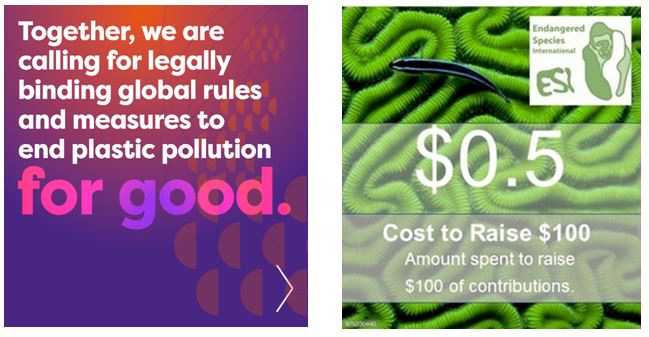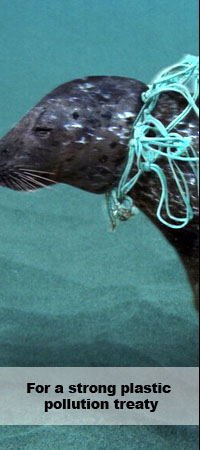|
We cannot miss the opportunity to stop plastic pollution. 175 nations agree to develop a legally binding agreement on plastic pollution by November 2024, prompting a major step towards reducing colossal ocean plastic pollution and greenhouse gas emissions from plastic production, use and disposal. But what next?
There are 5.25 trillion pieces of plastic debris in the ocean. Of that mass, 269,000 tons float on the surface, while some four billion plastic microfibers per square kilometer litter the deep sea.
Nations continue negotiations on a global treaty to end plastic pollution, and no final binding agreement has been reached yet. Every single day, plastic waste is discarded into nature at an alarming rate, harming wildlife, habitats, and communities in the process. Without swift and meaningful action to curb the plastic pollution crisis, global plastic pollution will double and plastic leakage into the ocean will triple today’s levels within one decade.
The final UN Plastic Treaty negotiation is planned for late November in Busan, South Korea, with important intersectional meetings in between. Endangered Species International will keep pushing for an ambitious and legally binding treaty that protects human health and wildlife. Plastic lobbies and some businesses are doing everything they can to make the treaty weak and nonexistent. With your support, we are fighting back for the common good, for a heathy planet, for all the life forms deeply affected by massive plastic pollution.
Together we can put in place a strong plastic pollution treaty by the end of 2024. Join ESI in making sure a strong treaty is passed and supporting our daily removal of plastics from the ocean. Join us. You can also help by signing this petition.
Endangered Species International is a member of #BreakFreeFromPlastic, a global movement working to achieve a future free from plastic pollution and an endorser of the Business Coalition for a Global Plastics Treaty.
About the plastic pollution crisis
Plastic debris with counts of five trillion, weighing more than 269,000 tones, is floating over the world's ocean surface as a result of improper waste disposal and mass consumption of single use plastics. The accumulated plastics in the ocean can be classified into four levels based on their sizes: megaplastics, macroplastics, mesoplastics, and microplastics. Microplastics are found in commonly manufactured, commercial products such as personal care and cosmetic products or microplastic particles produce from in-situ environmental degradation and subsequent fragmentation of larger size plastics by physical, chemical, and biological processes.
Microplastics are mostly abundant in marine and coastalsystems, while synthetic pollutants chemically interact with organic pollutants and metals.
Entanglement and ingestion are some of the critical issues associated with macroplastic fragments. According to the records, more than 13,000 individuals representing 208 species and more than 30,000 individuals belonging to 243 species have encountered issues related to ingestion and entanglement by macroplastic fragments,respectively. In the last decade, Endangered Species International has found green sea turtle, Hawksbill turtle, Fulmar, Seals, Sea Lions, puffin, Albatross, Right whale, and Greater shearwater killed by plastics found in the ocean. The crisis is happening and we must end plastic pollution starting by the end of the year.
Related Links

|











